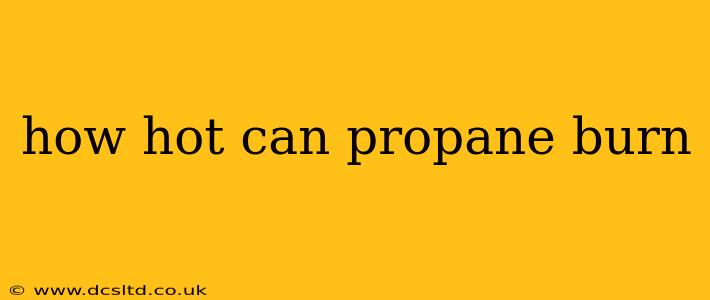How Hot Can Propane Burn? Understanding Propane's Burning Temperature
Propane, a widely used fuel for heating, cooking, and various industrial applications, burns incredibly hot. But the exact temperature isn't a single number; it varies based on several factors. Understanding these factors is crucial for safe and efficient propane use. Let's delve into the details.
What is the temperature of a propane flame?
The temperature of a propane flame can reach up to 3,600°F (1,980°C) under ideal conditions. However, this is the theoretical maximum. In reality, the temperature you experience will be lower, often significantly so.
What factors affect propane burning temperature?
Several factors influence the actual temperature of a burning propane flame:
-
Air-to-fuel ratio: The most critical factor. A perfect mix of propane and oxygen (air) results in the hottest flame. Too much or too little air leads to incomplete combustion and a lower temperature. This is why proper appliance maintenance and ventilation are vital.
-
Burner design: The design of the burner significantly affects the mixing of propane and air. Efficient burners achieve better mixing, resulting in higher temperatures. Inefficient designs can lead to wasted fuel and lower temperatures.
-
Pressure: Higher propane pressure generally leads to a hotter flame, as it increases the fuel flow rate. However, excessively high pressure can be dangerous and inefficient.
-
Ambient air temperature and humidity: Colder air and lower humidity can slightly increase the flame temperature, while warmer, more humid air can reduce it. These effects are relatively minor compared to air-to-fuel ratio and burner design.
-
Presence of impurities: Impurities in the propane or the air can reduce the combustion temperature and efficiency.
What is the average temperature of a propane flame?
While the maximum temperature is impressive, the average temperature of a propane flame is closer to 1,900-2,000°F (1,040-1,090°C) in typical applications like gas stoves or grills. This average reflects the less-than-perfect combustion conditions commonly encountered.
Is propane hotter than natural gas?
Yes, propane generally burns hotter than natural gas. While both are hydrocarbons, propane has a higher energy density, meaning it releases more energy per unit volume. This translates to a higher flame temperature.
How can I maximize the heat from my propane appliance?
To ensure your propane appliance operates efficiently and produces the highest possible flame temperature, follow these guidelines:
- Regular maintenance: Schedule regular inspections and cleaning of your appliances to prevent buildup that can obstruct airflow and reduce efficiency.
- Proper ventilation: Adequate ventilation ensures sufficient oxygen supply for complete combustion. Never use propane appliances in enclosed spaces without proper ventilation.
- Check for leaks: Regularly check for gas leaks to ensure safe and efficient operation.
Safety Precautions When Using Propane
Remember, propane is a flammable gas. Always exercise caution when handling propane and its related equipment:
- Never use propane indoors without proper ventilation.
- Follow all manufacturer's instructions and safety guidelines.
- Keep propane cylinders upright and secure.
- Store propane cylinders outdoors in a well-ventilated area.
By understanding the factors influencing propane flame temperature and following safety precautions, you can safely and effectively utilize this powerful fuel source. Remember, while it can burn incredibly hot, responsible usage is key to ensuring both efficiency and safety.
